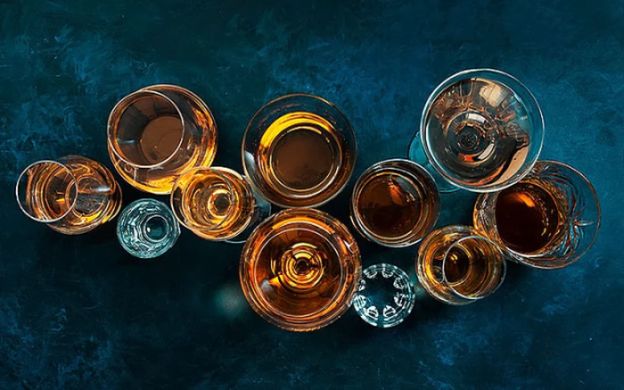Whiskey: The mere mention of the word conjures aromas of toasted oak, smoky peat and caramel. It is a golden elixir that bonds friends and marks countless celebrations. And just as the barrels that impart the spirit its unique notes are held together only by steel hoops, the familiar labels and well-known brands are girded by an invisible ring of Intellectual Property (IP) rights, defining and protecting the industry.
From questions of origin to the unique methods used in distillation, IP has helped shape the whiskey we know and love today. So, as you enjoy your next glass, know that what you are savoring is the result of a craft, tradition and legacy well-guarded by trademark law.
The origin of whisk(e)y
The etymology of whiskey can be traced back to the Old Irish term "uisce beatha," which was itself a translation of "aqua vitae" in Latin, meaning "water of life." This linguistic origin hints at a time when Irish monks in the High Middle Ages, around AD 1000-1200, were experimenting with distilling grain mash primarily for medicinal applications.
Across the Irish Sea, monastic communities in Scotland established their own distilling tradition in parallel. And by the late medieval period, the drink was well on its way to transitioning from a medicinal tonic to a consumer product.
The issue of origin reached a head in the 20th century with the implementation of geographical indications (GIs), a form of IP that identifies a product as coming from a specific locale and having "qualities or a reputation that are due to that origin." Both Irish whiskey and Scotch whisky are now protected by GIs, cementing their exclusive identities while fueling an ongoing debate over the beverage's true homeland.

Regardless of who was the first, it is clear that Irish and Scottish monasteries were distilling the spirit by the 15th century. With ready access to clean water and tithes of grain, cloistered monks were ideally positioned to apply themselves to this medicinal endeavor.
You will have noticed two different spellings used here: Ireland and the United States prefer "whiskey," while Scotland, Japan and elsewhere use "whisky." In the spirit of GIs, it seems fitting to choose the form relevant to the origin of the product, and, as we shall see, even something as outwardly innocuous as spelling can be a big deal in the IP world.
Innovation, globalization and law in modern whiskey culture
Lacking Europe's centuries-old experience with the drink, the Japanese market rapidly gained prestige by fine-tuning distillation methods and crafting new flavor profiles based on techniques borrowed from Scotland. This raises the interesting question of whether these more modern Japanese methods diminish Scotland's GI given that local expertise can be one of the defining characteristics that produces a unique, protectable commodity. Thankfully, GIs also account for how environmental conditions in a locality can define the ingredients' attributes. Thus, even though the methodologies may be similar, the grains and water in Scotland and Japan have distinctive enough qualities for their products not to impinge on each other.
Nevertheless, rising levels of counterfeiting are compelling the industry to evolve its approach to IP. The advent of blockchain technology presents a pragmatic solution, albeit one that carries some controversy. With the ability to track a bottle's journey from distillery to customer, cryptography provides an authentication mechanism that is nearly tamperproof. However, the implementation of this technology raises ethical and logistical questions, such as who would control this data and whether smaller distilleries could afford to participate.
The modern whiskey industry is a web of competing – and complementing – interests and priorities, blown by the ever-changing winds of globalization, innovation and legal frameworks. As IP laws continue to adapt, they will influence how we will produce, market and trade this ancient drink long into the future.

The earliest written record of whiskey appears in the Annals of Clonmacnoise (Ireland, 1408): "Richard or Risdard maGranell, chieftaine of Moyntir-eolas, died at Christmas by takeing a surfeit of aqua vitae, to him aqua mortis." More than six centuries later, the irony is still not lost.
Consumer-crafted IP narratives
As patrons become increasingly discerning, they often seek out whiskeys that offer intriguing histories or novel production techniques. This has led to a surge in distilleries creating limited-edition releases, experimental cask agings and small-batch productions. Such offerings often come with the promise of an original experience, but they also stir up potential IP conflicts, particularly when they are inspired by traditional recipes or methods from established whiskey regions.
For instance, a consumer attraction to "peated" U.S. whiskey could encourage distilleries there to explore techniques associated with Scotland. The result may well be a delightful dram, but it could also set the stage for international IP disputes, particularly if those U.S. producers made claims, directly or indirectly, to a Scottish legacy they did not own.
On the flip side, connoisseurs can serve as gatekeepers of authenticity. With greater attention being paid to the provenance of what they consume, whiskey enthusiasts are increasingly scrutinizing labels, origins and production locations before making a purchase.
Consumer behavior and preferences, therefore, are not passive elements in this IP landscape; they are active forces that shape distilleries' trademarks, certification strategies, licensing agreements and more.
Landmark trademark disputes
In the whiskey world, trademark clashes are often high-profile microcosms of the broader challenges facing the industry. These battles over naming rights, label designs and brand identities offer a lens into the complicated network of factors playing into the modern market.
The case between Maker's Mark and Diageo underscores this point compellingly. Here, the iconic dripping red waxy seal of Maker's Mark was enforced when Diageo introduced a similar seal on some of its own goods. Though Diageo sought to have their rival's trademark registration canceled, the courts sided with Maker's Mark, finding the stylistic element was valid and infringed. Given how much a whiskey's success rests on its reputation, it is essential for distilleries to protect those nuanced aspects of their brands.

A superior product is often not enough to garner success, as brands also need strong trademarks to distinguish themselves and stick in the minds of consumers. Once acquired, these valuable IP assets must be defended from copycats and imitators.
Another pivotal case revolved around the Scottish spelling convention and the term "Highland." In 2019, the Scotch Whisky Association objected to the Virginia Distillery Company's use of "Virginia-Highland Whisky" to describe its products. Despite clarifying its U.S. origins, the family business found itself in the legal crosshairs of the Scotch Whisky Association for employing regionally suggestive language in a disagreement that reveals the potential snares of casually using well-established signifiers. The good news is that the parties were able to reach an amicable solution that dropped the "Highland" moniker and kept the term "whisky." It is reasonable to assume many glasses were raised in toast at this conclusion.
Yet, among these quarrels, a recent underdog story stands out. The skirmish between Tennessee heavyweight Jack Daniel's and the Scottish comedy duo behind the Jack and Victor brand resulted in an unexpected loss for the world-famous U.S. company. The UK Intellectual Property Office (UKIPO) ruled in favor of Jack and Victor, holding that the trademark had become so strongly associated with Ford Kiernan and Greg Hemphill's characters in the BBC Scotland sitcom "Still Game" that the risk of consumer confusion within Scotland was minimal. Moreover, this case illustrates that a brand's local familiarity can withstand opposition from more established trademarks so long as they can be easily distinguished. Looks like comedians got the last laugh after all.
The history of whiskey is just as complex as its globe-spanning market is today, which is why it pays to remain clear-headed when navigating the many IP concerns of production and promotion. It might not be fair to label the experts at Dennemeyer as "vintage," but they have the seasoned legal knowledge, local representation and digital solutions to manage assets and settle disputes worldwide.
The content of this article is intended to provide a general guide to the subject matter. Specialist advice should be sought about your specific circumstances.

